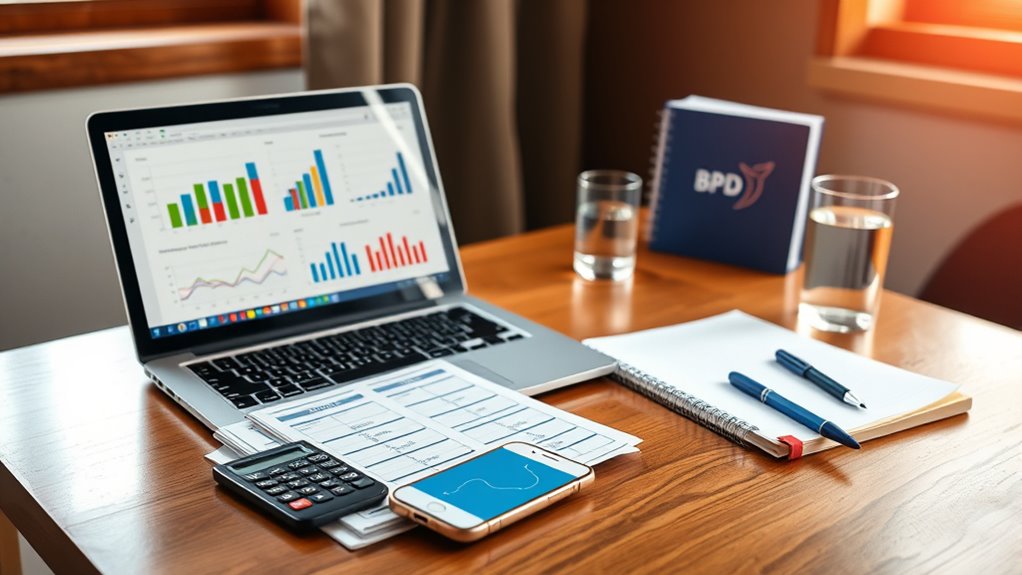Managing finances with BPD can be challenging due to impulsivity and emotional ups and downs. You might find yourself overspending or struggling to stick to budgets, leading to stress and setbacks. Creating structured plans, like automatic payments and expense tracking, can help you stay on top of your goals. Building support networks and using practical tools can make a difference. Keep exploring strategies that address your unique needs to improve your financial stability over time.
Key Takeaways
- Creating structured budgets and automatic bill payments can help manage impulsive spending associated with BPD.
- Building emergency funds and monitoring accounts reduce financial stress and promote stability.
- Engaging in emotional regulation therapy supports better decision-making and reduces impulsive financial behaviors.
- Seeking support from trusted individuals enhances adherence to financial plans and provides emotional resilience.
- Regular review of financial statements and progress fosters awareness and proactive management of finances.
Understanding How BPD Affects Financial Behavior

Understanding how BPD affects financial behavior requires recognizing how emotional instability influences decision-making. When you experience emotional dysregulation, your impulses can take over, leading to impulsive spending and risky financial choices. A flat iron bike can be a practical example of a product that may tempt impulsive purchases, especially when driven by emotional triggers. This impulsivity often results in financial instability, such as missed payments, overdrafts, or unpredictable expenses. Your emotional instability can cause you to make sudden decisions, sometimes driven by feelings of emptiness or self-criticism, which may lead to self-sabotage. Additionally, fears of abandonment or relationship struggles can foster financial dependency, making managing joint accounts difficult. These intense mood swings and impulsive tendencies create unpredictable financial behavior, making it tough to maintain consistent habits. Recognizing these patterns is the first step toward developing healthier financial strategies, especially as emotional regulation skills improve over time. Building financial resilience can help mitigate some of these challenges and promote more stable habits. Developing coping strategies can also assist in managing impulsive urges and emotional triggers related to financial decisions. It is also important to understand how interpersonal issues can influence financial decisions, as unstable relationships may lead to financial conflicts or dependency.
Common Financial Challenges Faced by Individuals With BPD

People with BPD often face significant financial challenges due to impulsive spending and difficulty controlling their impulses. Emotional dysregulation can cause sudden shifts in priorities, making budgeting and planning inconsistent. This impulsivity leads to risky behaviors like excessive credit card use or gambling, risking financial instability. The intense fear of abandonment may trigger impulsive purchases for reassurance. Poor decision-making, driven by emotional volatility, hampers progress toward long-term financial goals. To illustrate, consider the emotional toll of these behaviors:
| Impulsivity & Risky Behaviors | Financial Instability | Emotional Dysregulation & Decision-Making |
|---|---|---|
| Impulsive spending | Debt accumulation | Sudden shifts in financial priorities |
| Risky financial choices | Unpredictable finances | Difficulty evaluating options |
| Impulsivity in crises | Financial stress | Impaired judgment in decisions |
| Lack of budgeting discipline | Long-term goal setbacks | Emotional volatility impacting finances |
Strategies to Build Financial Stability and Manage Impulsivity

Managing financial stability for individuals with BPD requires implementing practical strategies that address impulsivity and emotional fluctuations.
Start by creating a structured budget aligned with your financial goals to curb impulsive spending. Using automatic payments helps prevent missed bills and reduces disorganization.
Create a structured budget and set up automatic payments to stay organized and prevent impulsive spending.
Regularly monitoring your accounts and keeping written records can improve your short-term memory and curtail impulsive decisions. Incorporating financial planning techniques can further enhance your ability to stay on track and avoid impulsive pitfalls.
Building an emergency fund provides a safety net, reducing the urge to borrow impulsively or rely on risky credit options. This practice can also support financial resilience during unpredictable emotional episodes.
Engaging in therapy focused on emotional regulation can decrease impulsivity that impacts your finances. Developing coping strategies can help manage emotional triggers that lead to impulsive financial decisions.
Additionally, maintaining awareness of air purifier maintenance dos and don’ts and following recommended filter replacement schedules can help minimize unexpected expenses related to appliance repairs or replacements, encouraging more consistent financial planning.
Being mindful of mental health and financial management can help you recognize patterns of impulsive spending related to emotional states and develop healthier coping strategies.
These strategies foster financial stability by promoting mindful spending habits and resisting impulsive urges, helping you maintain control over your money even during emotional ups and downs.
The Role of Support Systems in Financial Planning for BPD

Support systems play a crucial role in enhancing your financial planning when you have BPD, as they offer emotional stability that can reduce impulsive spending. These support networks, including family, friends, and mental health professionals, provide essential financial guidance and behavioral management. Establishing trust in your support system can significantly improve your ability to adhere to budgets and financial plans, even during emotional fluctuations. When you trust your support system, you’re more likely to stick to budgets and financial plans, even during emotional fluctuations. Consistent, non-judgmental communication from loved ones helps you stay focused and make better decisions. Incorporating mental health support into your financial planning allows strategies to be tailored to your BPD symptoms, improving overall mental health and reducing financial distress. Recognizing the importance of emotional regulation techniques can also help you develop new coping strategies to manage financial stress more effectively. Building resilience through social support enhances your capacity to face financial challenges with confidence and adaptability. Developing coping strategies that include financial boundaries and planning can further strengthen your resilience. Strong social support fosters stability, helping you navigate financial challenges with confidence and resilience.
Practical Tools and Resources for Better Money Management

Using practical tools and resources can greatly improve your money management, especially when steering through the emotional ups and downs associated with BPD. Budgeting tools and expense tracking apps help you monitor spending and set achievable financial goals, reducing impulsive decisions. Incorporating wave and wind considerations into your financial planning can help you anticipate and adapt to fluctuations, promoting more resilient financial habits. Automatic bill payments ensure you don’t miss deadlines during emotional dysregulation. Developing a financial crisis plan with trusted contacts or professionals provides a safety net during tough times. Accessing mental health support and tailored financial resources can offer guidance and emotional regulation strategies. Recognizing the importance of emotional regulation techniques can further support emotional stability, helping you manage financial stress more effectively. Exploring online income opportunities can also diversify your income streams and provide additional financial security. Tracking your popular juice brands and other healthy choices can enhance your overall well-being and financial awareness. Regularly reviewing your financial statements, preferably with a support person, increases awareness and control.
Frequently Asked Questions
What Not to Do With Someone With BPD?
You shouldn’t blame, criticize, or accuse them, as it can hurt and trigger emotional responses. Avoid dismissing their feelings or invalidating their experiences, which can increase distress.
Don’t make sudden changes to plans or decisions, as it might cause mistrust.
Stay calm during emotional outbursts, and don’t respond with anger, since that can escalate conflicts.
Recognize warning signs of impulsivity and respond with compassion to help them feel supported.
What Is the Best Career for Someone With BPD?
You’re wondering what the best career is for someone with BPD. To succeed, look for roles that offer flexibility, like freelance work or creative jobs, which can accommodate emotional fluctuations.
Avoid high-pressure, rigid environments that might worsen symptoms. Seek supportive workplaces with understanding management and colleagues.
Prioritize roles aligned with your strengths and coping strategies, and remember, self-awareness is key to maintaining stability and thriving professionally.
Do People With BPD Struggle With Money?
You might find that managing money is challenging because of the emotional ups and downs associated with BPD. Impulsive spending, difficulty sticking to budgets, and sudden financial decisions are common struggles.
Mood swings and impulsivity can lead to missed payments or debt. However, with awareness, support, and strategies like budgeting tools or therapy, you can improve your financial stability and develop healthier money habits over time.
Can People With BPD Be Successful in Business?
You might wonder if people with BPD can succeed in business. The answer is yes. With your creativity, resilience, and focus, you can build thriving ventures.
Challenges like emotional ups and downs don’t have to stop you; with support and coping strategies, you can manage them effectively.
Many entrepreneurs with BPD turn their passion into success, proving that emotional strength and determination make a powerful combination.
Conclusion
By understanding how BPD influences your financial habits, you can take control and build stability. Remember, even in the midst of chaos, tools like budgeting apps and supportive networks can help you stay on track. Don’t forget, as Benjamin Franklin once said, “An ounce of prevention is worth a pound of cure.” With patience and the right strategies, you can master your finances and create a more secure future for yourself.









